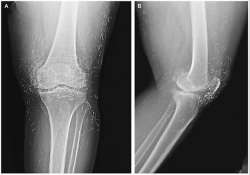Doctors find hundreds of gold needles in South Korean woman's knees
New Delhi: Doctors have found hundreds of gold needles nested in a 65-year-old South Korean woman's knees. The woman suffers from osteoarthritis, so she visited an acupuncturist to relieve her pain. The acupuncturist thought it

New Delhi: Doctors have found hundreds of gold needles nested in a 65-year-old South Korean woman's knees.
The woman suffers from osteoarthritis, so she visited an acupuncturist to relieve her pain.
The acupuncturist thought it was a great idea to insert all these needles in her knees and leave them there, because that's always a great idea, right?
Doctors say when pain relievers and anti-inflammatory drugs didn't help, the patient turned to acupuncture, an alternative medical practice that uses needles to stimulate certain points on the body to alleviate pain or treat diseases.
However, the acupuncture expert decided to leave the needles, said to be made of gold, inside her tissue to ensure continued stimulation.
But, experts say leaving foreign objects inside the body is not a good idea since the body starts rejecting them and wants to get rid of them and this can lead to inflammation, abscesses and infection.
Doctors say the South Korean patient can't go into an MRI because the needles are likely to move and damage an artery.
The woman suffers from osteoarthritis, so she visited an acupuncturist to relieve her pain.
The acupuncturist thought it was a great idea to insert all these needles in her knees and leave them there, because that's always a great idea, right?
Doctors say when pain relievers and anti-inflammatory drugs didn't help, the patient turned to acupuncture, an alternative medical practice that uses needles to stimulate certain points on the body to alleviate pain or treat diseases.
However, the acupuncture expert decided to leave the needles, said to be made of gold, inside her tissue to ensure continued stimulation.
But, experts say leaving foreign objects inside the body is not a good idea since the body starts rejecting them and wants to get rid of them and this can lead to inflammation, abscesses and infection.
Doctors say the South Korean patient can't go into an MRI because the needles are likely to move and damage an artery.